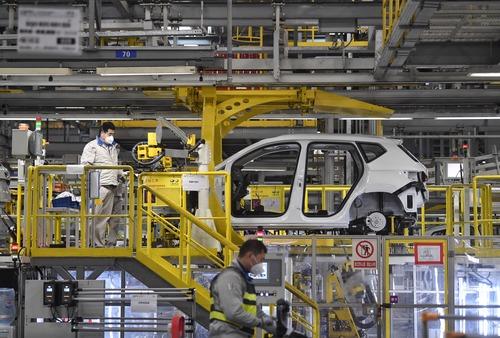NANJING, May 26 (Xinhua) -- Every workday morning, nearly 400 employees of Cablex Electronics (Xuzhou) Co., Ltd. put on masks and goggles and get their temperature measured before starting the day's work.
The company, located in the city of Xuzhou, east China's Jiangsu Province, is a wholly foreign-owned enterprise with headquarters in Slovenia. As the COVID-19 epidemic has waned in China, the company has resumed its full production capacity, churning out millions of wiring harnesses every day.
Governments at different levels in China have shown great efficiency in implementing measures to contain the epidemic, which has bolstered the confidence of foreign companies in China, said Bostjan Slajkovec, general manager of the company.
"We are determined and confident to reach our sales target this year," Slajkovec said, adding the company has maintained an average of 30 percent annual sales growth since it settled in Xuzhou.
According to a recent survey by the Ministry of Commerce, of 8,200 major foreign companies in China, 76.6 percent of them had a resumption rate of over 70 percent as of the end of April.
China has more than 400,000 foreign-funded firms, over 90 percent of which are small and medium-sized enterprises.
Foreign firms can equally enjoy preferential policies that China has rolled out to help domestic companies cope with the fallout of the epidemic, including financial support and tax cuts, according to the ministry.
Andreas Risch, managing director of Fette Compacting (China) Co., Ltd., a German pharmaceutical giant, said thanks to the supportive policies such as helping purchase anti-epidemic materials and reducing transportation fees, production of the company quickly returned to normal.
In Jiangsu, a main destination of foreign direct investment in China, the resumption rate of foreign firms has climbed to 99 percent by mid-May, according to the provincial bureau of commerce.
"As the pace of work resumption of foreign firms is quickening, their confidence in investment is also growing," said Liang Ruiheng, an official with the commerce bureau in Xuzhou.
Dutch company ASML Holding, a key supplier of chip-making equipment, signed a deal with the local government this month to expand its technical service base in Wuxi, another city in Jiangsu.
The upgraded base will consist of two 2,000-square-meter centers that will provide services such as maintenance and upgrade of lithography equipment. ASML said the move was to meet increasing demand in the Chinese market.
British pharmaceutical giant AstraZeneca has also expanded its presence in China as the epidemic eases. In late April, the company launched an international life science innovation park in Wuxi's high-tech zone.
The innovation park has benefited from a series of governmental policies in areas like research and development, taxation, intellectual property rights and commercialization, according to Wuxi municipal government.
"During the epidemic, the government has given us great support," said Tina Xu, vice president of AstraZeneca China. "We have full confidence in our future development in China, as we are optimistic about the bright prospects of the Chinese economy and the life sciences industry." Enditem




 A single purchase
A single purchase









